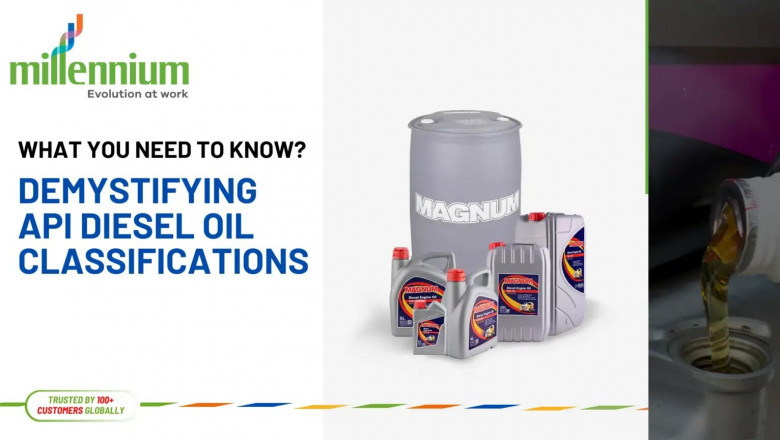views
Demystifying API Diesel Oil Classifications: What You Need to Know
Understanding API Diesel Oil Classifications
The American Petroleum Institute (API) establishes performance categories for diesel engine oils to ensure optimal engine protection and efficiency. API classifications help consumers and industries select the right oil based on their engine requirements, fuel types, and operating conditions.
API diesel oil classifications are divided into two main categories:
-
C-category (Compression Ignition): These oils are designed for diesel engines and are denoted with a "C" followed by a letter (e.g., CJ-4, CK-4).
-
S-category (Spark Ignition): These oils are primarily for gasoline engines and are denoted with an "S" followed by a letter (e.g., SN, SP).
For diesel engines, the most common API classifications include:
-
CI-4: Designed for high-speed, four-stroke diesel engines to enhance wear protection and soot control.
-
CJ-4: Introduced to meet 2007 emissions standards, it supports engines with exhaust after-treatment systems.
-
CK-4: Offers improved oxidation resistance, shear stability, and protection against wear in modern engines.
-
FA-4: A low-viscosity oil intended for newer engines requiring improved fuel efficiency while maintaining durability.
Factors to Consider When Choosing API Diesel Oil
Selecting the right API diesel oil involves understanding key factors such as:
-
Engine Type and Age: Older engines may require higher viscosity oils (e.g., CI-4), whereas newer models benefit from CK-4 or FA-4 classifications.
-
Operating Conditions: Vehicles operating in extreme temperatures or heavy-duty applications may require oils with higher oxidation stability and shear resistance.
-
Manufacturer Recommendations: Always check the vehicle or equipment manufacturer’s manual for API classification and viscosity grade specifications.
-
Emission System Compatibility: Oils like CJ-4 and CK-4 are designed for engines with diesel particulate filters (DPFs) and selective catalytic reduction (SCR) systems.
-
Fuel Type and Sulfur Content: Some oils perform better with ultra-low sulfur diesel (ULSD), which is essential for emissions compliance.
Benefits of Using API-Certified Diesel Oil
Using API-certified diesel oil provides numerous benefits, including:
-
Enhanced Engine Protection: API-rated oils are formulated to reduce wear, corrosion, and deposit formation, extending engine life.
-
Improved Fuel Efficiency: Advanced formulations help reduce friction and optimize engine performance, leading to fuel savings.
-
Better Emission Control: API diesel oils are designed to work efficiently with modern emission control systems, reducing environmental impact.
-
Compatibility with Modern Diesel Engines: API classifications ensure that oils meet the latest performance requirements for new engine technologies.
-
Industry Standard Compliance: API-certified oils are tested rigorously to meet industry standards, ensuring quality and reliability.
Conclusion
Understanding API diesel oil classifications is crucial for maintaining the longevity and efficiency of diesel engines. By choosing the right API-rated oil based on engine type, operating conditions, and manufacturer recommendations, users can enhance performance, reduce maintenance costs, and comply with emission regulations. Whether for heavy-duty trucks, industrial equipment, or modern diesel vehicles, selecting API-certified diesel oil ensures reliability, efficiency, and environmental responsibility.














Comments
0 comment